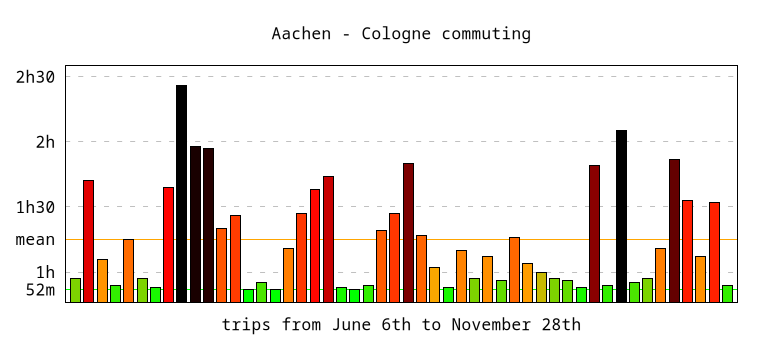I've moved from Aachen to Cologne a few months ago, but I will be continuing to work in Aachen for some time. This means that I need to commute for work. Thankfully, I can accommodate a few days a week of homeoffice, and I am able to stay at some friends basically whenever I want during the week (I have nice friends). Right now, the idea is to stay three days straight in Aachen and to work the two remaining days in homeoffice. This way, I only have to commute once a week for work.
Since I don't own a car, rail is the transportation of choice to commute between Cologne and Aachen: the connection is direct, regional trains run twice an hour and riding is free for me, since university students get to travel inside the entire federal state1 for free (except using high-speed trains). And because I still don't have an acute need for a car outside of that, it's a no-brainer.
Before moving to Cologne, it was my girlfriend who had to commute the other way around, all while having less favorable conditions than mine: no real homeoffice options and almost daily scheduled appointments. And oh boy she was not having a good time: trains were very often late, sometimes altogether canceled, last-minute schedule changes occurred almost daily… This happens on top of exceptional events like nationwide transport strikes or some meteorological misfortunes ranging from the occasional rainy episode to the deadly floods that hit Belgium and Germany in 2021. This makes for a very unpredictable commuting experience. Apparently, this is symptomatic for the current state of the entire Bahn2, whose reliability has been deteriorating constantly for the past few years, so much so that it is now becoming the butt of everyone's jokes in Germany3.
Now that I'm (sort of) in my girlfriend's shoes, I will also be able to regularly experience the Bahn for myself. For this occasion, I've decided for science's sake to keep a log of my commuting trips between Aachen and Cologne. I will just note down the time it takes between the planned departure of the train and the time I arrive at destination, which should last, when on time, 52 minutes.
Update (30.11.2023):
From now on, I won't commute regularly to Aachen anymore, so I've stopped logging my trips and updated the chart below accordingly. The Deutsche Bahn is well on its downward trajectory and I can hardly imagine how someone could commute daily using the regional train transport (at least on the Aachen-Cologne axis) for an occupation with any time constraints. The whole deal was quite frustrating, even when commuting only twice a week…! I can only hope that the situation gets better, as this mode of transport is more important that ever!

Footnotes:
North Rhine-Westphalia in my case.
Short for Deutsche Bahn, Germany's national railway company.